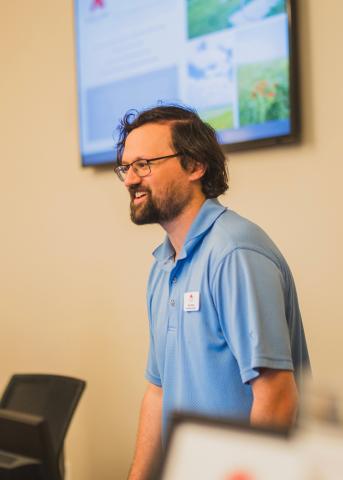
Nick Powers, Our On-Staff Nebraska Master Naturalist
Our visitor services coordinator and expert guide, Nick Powers, recently completed the Nebraska Master Naturalist Program, a week-long course of classes and activities that provides certification for its conservation and education volunteers. Classes ranged from plants and animals, to ecosystems, environmental education, and citizen science. Nick gained deeper knowledge of the different plants and animals of Nebraska, as well as conservation efforts in the state. Many of the instructors are involved with the Nebraska Games and Parks or the University of Nebraska.
Nick has been with the Willa Cather Foundation since January 2022 and is currently pursuing a Master’s degree in public history through the University of Nebraska-Kearney, which he hopes to complete in 2026. Of his tours, director of education and engagement Rachel Olsen says, "Nick is eager to engage visitors and enjoys refining the story he tells at each of our historic sites. By taking a master naturalist course, he will in turn enhance the story we tell on the prairie."
“The program connects you with different resources on Nebraska’s ecosystems,” Nick said. “I wanted to get better at the Prairie Tour, particularly talking about the plants and animals that live on the prairie. I could provide history on the land but was less knowledgeable when it came to the environmental side. The Master Naturalist program was suggested as a way for me to improve my environmental knowledge and to augment our prairie tour materials.”
“Since 2019 we have offered professional development funding for full-time employees, which allowed Nick to broaden his knowledge of the prairie and our conservation of it,” said Tracy Tucker, director of collections and curation. “Our ongoing work of preserving the Willa Cather Memorial Prairie hinges on both a knowledgeable, professionalized staff and dedicated, informed supporters of our work.”
Nick enjoyed his instructors and fellow participants and their enthusiasm, which made for “a memorable experience.” He added: “Professionally, [the program] provides more information about the unique ecosystem that is the prairie and information that can make the tour more engaging. The program can also connect the National Willa Cather Center to resources on preservation, conservation, and environmental education.”
He continued: “Cather wrote extensively about the prairie in her novels. However, there is hardly any prairie left for visitors to experience. It is important that we include environmental information, alongside the literary connections, to show why the Willa Cather Memorial Prairie is a special and unique place.”
What did you learn that might specifically apply to the interpretation and visitor experience at the Willa Cather Memorial Prairie?
The resources that the Master Naturalist Program provides can help us internally to develop better resources for tour guides and tools that can provide both simple and enticing information that guides can use for tours to engage visitors. My background is in history, not ecology. Developing resources that can help myself and our other guides understand the common plants and animals of the prairie will allow them to better engage with guests about the ecological side of the prairie.
How might the Prairie Tour be enhanced and modified going forward with your new skillset?
We can include more information on the ecosystem. We are good at connecting the prairie to Cather and her works—that emotional connection to the land. Providing more content on the environment will help visitors understand how unique the prairie ecosystem is, why it fascinated Cather, how it impacted settlers, and why it is necessary that we preserve it.
